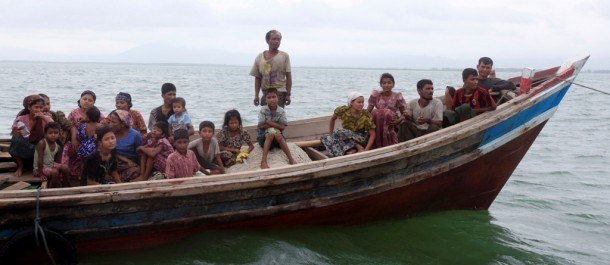Forty-three of the 85 Rohingya boatpeople who were sentenced to one year in prison for illegally entering Burma were on Wednesday released under a presidential pardon, with the remaining 42 due to be released on Thursday, according to sources in Mon State.
The 85 were sentenced in June and have been detained in Moulmein Prison since being arrested in May when their boat broke down while they were attempting to flee to Malaysia. The economic refugees were rescued in high seas by Mon fishermen and taken to the town of Ann Deim in Ye Township, Mon State. They were fed and sheltered by local villagers, but were subsequently arrested and detained for allegedly violating Burma’s immigration law.
Sources in Moulmein said that the 43 were pardoned by Burmese President Thein Sein, and were transported by truck to Pegu Division on Wednesday night.
Speaking to The Irrawaddy on Thursday, a Muslim religious leader in Pegu, Than Htike Aung, said that he had met the 43 released Rohingyas who were mostly young men between the ages of 17 and 50. He said they could not speak Burmese.
Than Htike Aung said that when the remaining 42 economic migrants arrive in Pegu, the local police intend to transfer them to Buthidaung near the Bangladeshi border.
He said that he and other representatives of the Muslim community in Pegu had brought food to the Rohingya boatpeople that morning, and had documented the returning refugees in case any of them go missing en route to the western border.
Rohingya people perennially leave their homes and families in Burma and Bangladesh where they face extreme discrimination and are denied citizenship.
The Muslim Rohingya often find they have little alternative but to try to travel illegally across the Andaman Sea to try to find work in Thailand, Malaysia or another third country.
They are frequently described by human rights groups as “one of the most persecuted people in the world.”
The Rohingya issue drew international attention in 2009 when the Thai military was accused of intercepting boatloads of Rohingyas, sabotaging their vessels, and abandoning them at sea.















